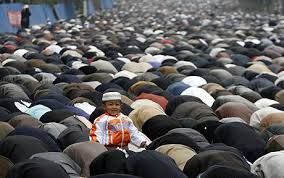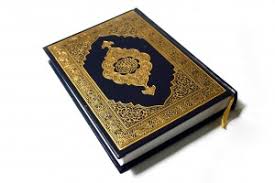Islamic Holidays History
Source(google.com.pk)
There are three main holidays in Islam: Eid Al-Fitr, Ramadan and Eid Al-Adha. Eid Al-Fitr is celebrated at the end of Ramadan (a month of fasting), and Muslims usually give zakat (charity) on the occasion. Eid Al-Adha is celebrated at the end of Hajj (annual pilgrimage to Mecca), which is one of the five pillars, and Muslims usually sacrifice an animal and distribute its meat among family, friends and the poor.
All Islamic holidays follow the lunar calendar, and thus move each year relative to the solar calendar. The Islamic calendar has 12 months and 354 days on a regular year, and 355 days on a leap year.
Contents [show]
Eid holidays [edit]
Main articles: Eid al-Fitr and Eid al-Adha
Other occasions [edit]
Ashura Day [edit]
Main article: Day of Ashura
Ashura is commemorated by Muslims on the ninth and tenth days of Muharram on the Islamic Calendar. Ashura is an Arabic word meaning "tenth". The Shia commemorate this day in the memory of the great sacrifice given by the grandson of Muhammad, Hussain against the Yazid. The Yazid, according to the Shia, due to his lineage was not the rightful leader of the Muslims. Hussain organized a revolt against him but was betrayed by his followers when battle started. Hussain and a large number of his family members were killed as a result. The Shia believe that this sacrifice established the beginning of true Islam.[1]
According to Orthodox Islamic tradition, this day commemorates God saving Moses and the Israelites from Pharaoh in Egypt as they crossed the Red Sea (the Exodus day). According to Judaism, the Israelites left Egypt on the first day of Passover, and they crossed the Red Sea seven days later on the 21st of Nisan, both of which are celebrated as holidays.[2] It is Narrated in Sahih al-Bukhari:
When the Prophet (peace be upon him) arrived at Medina, the Jews were observing the fast on 'Ashura' (10th of Muharram) and they said, "This is the day when Moses became victorious over Pharaoh," On that, the Prophet (peace be upon him) said to his companions, "You (Muslims) have more right to celebrate Moses' victory than they have, so observe the fast on this day."
—Sahih al-Bukhari Book 65, Hadith 4726
Laylat ul Isra and Miraj [edit]
Main article: Lailat al Miraj
Laylat ul Isra and Mi'raj is Arabic for the “Night of the Journey and Ascension”. It is on 27th of Rajab. It is the night when Muhammad was, according to Hadiths, taken to “the furthest mosque” (generally understood to be Jerusalem) on a Buraq (a beast resembling horse with wings; some people consider it a cherub) and ascended to the highest level of the heavens. It is said that he requested God to reduce the number of prayers, which started at fifty a day, but on his way down he met Moses, who asked him to ask for a reduction in the number because the requirement was difficult for Muhammad's people. Muhammad returned to God and several times asked for, and was granted a reduction of five prayers, until the number was reduced to five in total, with the blessing that if they were properly performed, the performers would be credited with fifty prayers instead of five. The event of this Night has also been described in Quran in Part 15 the beginning of Surah Isra.
Laylat al-Qadr [edit]
Main article: Laylat al-Qadr
Laylat al-Qadr is Arabic for “The Night of Power”. It falls on one of the last ten days of Ramadan usually on an odd numbered day. It is considered the holiest night of the year, since it is the night in which the Qur'an was first revealed. It is also considered better than a thousand months [Quran 97:1–3]. It is said that if a person performs voluntary worship on this night, that worship is equal to a thousand months or approximately 80 years.
Religious practice [edit]
Fasting [edit]
Main article: Ramadan
Ramadan is the month in which Muslims must fast from dawn to sunset. This is meant to feel how the poor people are without food or water. In addition, Muslims close their bodies off from earthly demands by denying themselves food and drink. This in turn allows for the nourishment of the soul. In addition, there are culture-specific beliefs regarding the watching of television, listening to music, and the perusal of any secular vice that does not in some way enhance spirituality.










Source(google.com.pk)
There are three main holidays in Islam: Eid Al-Fitr, Ramadan and Eid Al-Adha. Eid Al-Fitr is celebrated at the end of Ramadan (a month of fasting), and Muslims usually give zakat (charity) on the occasion. Eid Al-Adha is celebrated at the end of Hajj (annual pilgrimage to Mecca), which is one of the five pillars, and Muslims usually sacrifice an animal and distribute its meat among family, friends and the poor.
All Islamic holidays follow the lunar calendar, and thus move each year relative to the solar calendar. The Islamic calendar has 12 months and 354 days on a regular year, and 355 days on a leap year.
Contents [show]
Eid holidays [edit]
Main articles: Eid al-Fitr and Eid al-Adha
Other occasions [edit]
Ashura Day [edit]
Main article: Day of Ashura
Ashura is commemorated by Muslims on the ninth and tenth days of Muharram on the Islamic Calendar. Ashura is an Arabic word meaning "tenth". The Shia commemorate this day in the memory of the great sacrifice given by the grandson of Muhammad, Hussain against the Yazid. The Yazid, according to the Shia, due to his lineage was not the rightful leader of the Muslims. Hussain organized a revolt against him but was betrayed by his followers when battle started. Hussain and a large number of his family members were killed as a result. The Shia believe that this sacrifice established the beginning of true Islam.[1]
According to Orthodox Islamic tradition, this day commemorates God saving Moses and the Israelites from Pharaoh in Egypt as they crossed the Red Sea (the Exodus day). According to Judaism, the Israelites left Egypt on the first day of Passover, and they crossed the Red Sea seven days later on the 21st of Nisan, both of which are celebrated as holidays.[2] It is Narrated in Sahih al-Bukhari:
When the Prophet (peace be upon him) arrived at Medina, the Jews were observing the fast on 'Ashura' (10th of Muharram) and they said, "This is the day when Moses became victorious over Pharaoh," On that, the Prophet (peace be upon him) said to his companions, "You (Muslims) have more right to celebrate Moses' victory than they have, so observe the fast on this day."
—Sahih al-Bukhari Book 65, Hadith 4726
Laylat ul Isra and Miraj [edit]
Main article: Lailat al Miraj
Laylat ul Isra and Mi'raj is Arabic for the “Night of the Journey and Ascension”. It is on 27th of Rajab. It is the night when Muhammad was, according to Hadiths, taken to “the furthest mosque” (generally understood to be Jerusalem) on a Buraq (a beast resembling horse with wings; some people consider it a cherub) and ascended to the highest level of the heavens. It is said that he requested God to reduce the number of prayers, which started at fifty a day, but on his way down he met Moses, who asked him to ask for a reduction in the number because the requirement was difficult for Muhammad's people. Muhammad returned to God and several times asked for, and was granted a reduction of five prayers, until the number was reduced to five in total, with the blessing that if they were properly performed, the performers would be credited with fifty prayers instead of five. The event of this Night has also been described in Quran in Part 15 the beginning of Surah Isra.
Laylat al-Qadr [edit]
Main article: Laylat al-Qadr
Laylat al-Qadr is Arabic for “The Night of Power”. It falls on one of the last ten days of Ramadan usually on an odd numbered day. It is considered the holiest night of the year, since it is the night in which the Qur'an was first revealed. It is also considered better than a thousand months [Quran 97:1–3]. It is said that if a person performs voluntary worship on this night, that worship is equal to a thousand months or approximately 80 years.
Religious practice [edit]
Fasting [edit]
Main article: Ramadan
Ramadan is the month in which Muslims must fast from dawn to sunset. This is meant to feel how the poor people are without food or water. In addition, Muslims close their bodies off from earthly demands by denying themselves food and drink. This in turn allows for the nourishment of the soul. In addition, there are culture-specific beliefs regarding the watching of television, listening to music, and the perusal of any secular vice that does not in some way enhance spirituality.
Pictures Photos Pics 2013
Pictures Photos Pics 2013
Pictures Photos Pics 2013
Pictures Photos Pics 2013
Pictures Photos Pics 2013
Pictures Photos Pics 2013
Pictures Photos Pics 2013
Pictures Photos Pics 2013
Pictures Photos Pics 2013
Pictures Photos Pics 2013
Pictures Photos Pics 2013
No comments:
Post a Comment